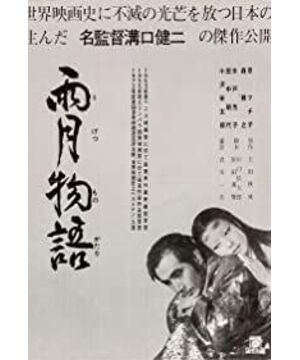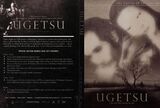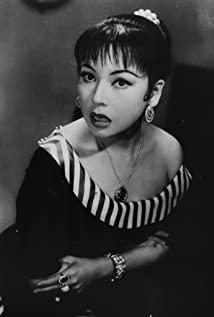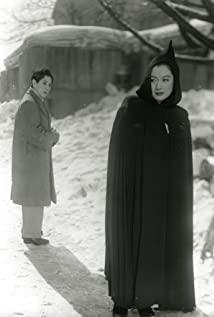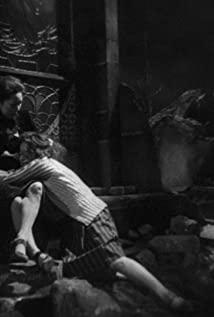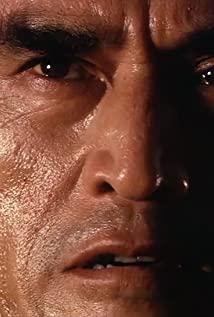finished watching "The Story of Rainy Moon" at the master screening, the first word that came to my mind was "realism", and later there was this term-"realism ghost story", which is used to generalize these movies of the same genre. , Of course, I am the only one using it now. On the surface, realism and strange talk should be a set of opposites, but from the narrative standpoint of the masters, realism is seeking truth. Although strange talk is a fictional story, the purpose of narration is to seek truth. At least logically, it is necessary to create an impeccable truth. From this point of view, the two are actually quite amalgamated, but they can reconcile the two into one, and only masters like Mizoguchi Kenji can do it at their fingertips. They can always find a balance between seemingly opposite things so that they can be contained in the same container. Corresponding to the "Rainy Moon Story", the realistic scenes that permeate the breath of daily life and the strange talk scenes full of mysterious beauty, although there are completely different technical aspects and expression methods (stage beauty, lighting, performance, soundtrack, etc.) Atmosphere and tone, but Kenji Mizoguchi’s processing method effectively blurs the boundary between the two in ideology: he aestheticizes the real scene-recording with the traditional silk scroll painting technique; at the same time, staged the surreal scene- -Use the style of Noh drama to transform fiction into reality, so that mutually exclusive things are finally reconciled by "beauty", and characters can freely enter and exit between fiction and reality.
The so-called realism naturally has a critical element in it. In "Rainy Moon Story", what is directly visible is the criticism of war. At the beginning of the story, the sentence "war makes people completely changed" quoted by Genjuro's wife Miyagi was used as the starting point; afterwards, the two men's ambitions were set aside by the war and the two men’s huangliangyi dream and dream fragmentation were included. The tragic fate of the three women; for the last time, through Fujibei's wife Ahama, the critical theme of "war ambition drives us crazy", and the behavior of Fujibei throwing his helmet and spear to express ordinary people's war-weariness , This is extremely straightforward realism, without pretense. Combined with the contemporary background of the production of "Yueyue Monogatari", it vaguely contains the aversion and criticism of Japanese militarism by the Japanese people after World War II. Returning to the 16th-century Japanese Warring States Period in the story of "Rain Moon Story", the plot criticized the social system at that time by portraying the tragic fate of women, showing that the root of this situation lies in the patriarchal society. This thought also has a strong realistic color, which represents Kenji Mizoguchi's review of the past and the present, and overall criticism of the Japanese social structure. Under this criticism, Mizoguchi Kenji vaguely proposed a solution to the problem, namely abstinence and the return to the family and the garden. This kind of thinking is obviously personal, and there are more ideals and romances in it, and some are even negative (part of it stems from Mizoguchi Kenji's passiveness when facing his own creative thought changes during and after the war).
Under the surface criticism, we are now trying to go a step further and touch Mizoguchi Kenji's deep thoughts. In the ridicule of the patriarchal society, unexpectedly, we found that Mizoguchi Kenji did not treat men as a single and flat image under the lens. For the two men in the story driven by desire and ambition, the turmoil brought about by the war is just an opportunity. The reason why they are easily moved or driven by desires is, in the final analysis, the predicament brought about by poverty. This repression is social, and it arises from the gap between male status, social responsibilities and abilities, and the status quo; that is, it first stems from the general expectation of male patriarchal public opinion for men, and at the same time stems from the expectation of wives in the family for husbands. For Fujibei, a large part of the pressure comes from the family. As a male, the role is not enough to cause the wife (female) to be in a strong position, which leads to depression, and thus expands to society. This is in the mockery of his samurai dream by his wife Ahama. It is clearly visible that this phenomenon is not temporary, but long-term. For Genjuro, his social role is more important, not only as a husband but also as a father, so he has a stronger sense of responsibility and works harder. However, the turbulent status quo has always restricted him and caused great pressure. In this status quo, men actively seek change and try to become more qualified social roles, which becomes justified and reasonable. From this we find that in "The Story of Yuyue", in the metaphor of the patriarchal society, men are not in a position to be criticized.
Continuing to penetrate Genjuro's world, besides being a member of the social system, there is a deeper metaphor for his depression. After encountering Wakasa, this deep repression, that is, the repression that an artist encounters in the real society, is fully exposed. One is that the normative system suppresses the artist’s free nature, and the social system requires him to take responsibility as a system. One member assumes the family responsibility of being husband and father. The role and sense of morality conferred by this system obviously suppressed some of his nature as an artist and restricted his free pursuit of love and beauty; the other suppression was the artist's painstaking effort. The creation that is not understood and recognized here can obviously be regarded as a kind of self-expression of Mizoguchi Kenji as a creator. Genjuro loved his wife Miyagi, but Miyagi couldn't understand his fanatical artistic passion as an artist; at the same time, his artistic talent was ignored by society and the community. That is, the system recognizes his social role as a man, husband, and father, but ignores his identity as an artist. Only when he gets along with Wakasa can his artistic talent be recognized. At the same time, the artistic crystallization of talent, passion and madness will glow with incomparable beauty. This kind of knowledge, confidant, and confidant enables him to break free from morality. Restraint, escape the realistic pressure given to him by social norms, and thoroughly feel freedom and indulgence in an illusory space.
In this unrealistic space, Genjuro and Wakasa's mysterious conversation, the realistic meaning is more like a man's daydream. Correspondingly, the mediocre Fujibei accidentally got the head of the enemy general and was able to return to his hometown in splendor, which is obviously a man's pipe dream. The two are fictitious and the real, but both belong to the category of dreams, and the interweaving of fictitious and real dreams is also an important reason why the story can reconcile reality and surrealism. Comparing these two dreams, one is illusory and beautiful, the other is a realistic comedy full of coincidences, and the corresponding is Genjuro and Fujibei's different identities. As an artist, his daydreams can easily develop into aesthetics. The tragedy, and Fujibei’s small character and humor determine that his dreams are mainly coincidences and exaggerations, and the final ending is more dramatic. When the two woke up from a dream and the dream and reality were connected, Genjuro's story naturally developed into a tragedy, and the story of Fujibei developed into an ironic comedy. The meaning expressed here is that, firstly, the dream becomes an extension of reality as a repressed instinct, and when the dream wakes up, reality becomes an extension of the dream. In this way, the past, the present and the future are linked together. The "Yuyue Story" in " There is no space-time barrier in the physical sense between "The Story" and "Strange Stories". They are just different reflections of reality, which constitutes the “Strange Stories of Realism”.
What is the significance of this reality? According to Freud's theory, daydreams appear as a realization of unsatisfied desires in real life. This unsatisfied desire is embodied in "Yuyue Monogatari". It is produced by the two men living in the system when the family structure is out of balance. It is a desire that cannot be obtained or realized by the other half in the family. , This can also be regarded as an externalization of the loneliness of a man's inner heart. In Fujibei’s family, because he could not play his role well, his wife was in a strong position. He was mostly obedient to his wife, so that the pressure he was under could not be recognized by his wife, so he turned to the outside world. Trying to reverse the weak position in the family through the promotion of social status, this is the expansion of the samurai dream, it is not that he does not love his wife. In Genjuro’s family, he is relatively in a strong position, and plays his role as a husband and father very well. However, his buried artist will never be discovered and praised by his wife. This is also him. Even with a strong sense of responsibility and morality, it is still the reason for being seduced by female ghosts. This kind of opportunity can be understood as an imbalance of gender status in the family, and the lack of spiritual communication between men and women.
These problems will obviously be resolved in the end. But the reason why Mizoguchi Kenji is negative is that in this war between the sexes, he regards returning to the family as the only way out, and the family as the eternal destination of the relationship between men and women. At the end of the story, he used a compromise method to regroup the two families. Ahama was raped by soldiers and lost her chastity, so that her status in the family was weakened invisibly, so that even if Fujibei gave up her samurai status, the gender structure in the family could be balanced. For Genjuro, his return is the defender of social norms-Monk Yu put the derailed person back into the system, so that he accepted the ending of returning to the family with the guilt of his family and his wife. From a male standpoint, these two men’s efforts to realize themselves and their struggles to get rid of the shackles of the system all ended in failure and became a dream. Compared with women's proactive stance and desire to return to their families and expect men to return to their families, even though they have suffered a lot of pain and even paid their lives as a price, the outcome is what they want. In contrast, men who returned to their families passively suffered twice as much pain. "The Story of Yuyue" is of course a tragedy for women, but the grief suffered by men is actually farther away.
Looking at Kenji Mizoguchi's "feminine consciousness" from this kind of sexual tragedy in the story, we can find that it is not the so-called "feminine consciousness" in the absolute sense, at least not in this film. The female consciousness expressed by Kenji Mizoguchi in "Uzuki Monogatari" is a general psychology shared by Japanese men and women, and it is an overall manifestation of Japanese people's self-representation with female images. In the book "Legends and Mind of the Japanese", Kawai Hayao, through the psychoanalysis of some ancient legends circulating in Japan, accurately summarized the deep psychological structure under the appearance of the Japanese patriarchal society-"Japan The human ego is not a hero who wins the heart of beauty after fighting off monsters, but after experiencing patience and the test of survival, transforming into a very active woman, acting as a beacon of wisdom for men who do not understand the value of treasures, this image is the most It is suitable for the self-image of the Japanese." This view of "feminine consciousness" is based on anti-feminist consciousness in a sense. The negative concept of Mizoguchi Kenji mentioned earlier-the return to the family, that is, marriage as the only way to resolve the conflict between men and women under this patriarchal system, is precisely this dependence in the unique "feminine consciousness" of Japanese society. , The embodiment of relativity (male domination society) characteristics. At the same time, we can also find that the emotional power contained in "The Story of Yuyue" is precisely derived from the "beauty of compassion" expressed in such stories; it must be emphasized that this "beauty of compassion" is not one-way.
View more about Ugetsu reviews


